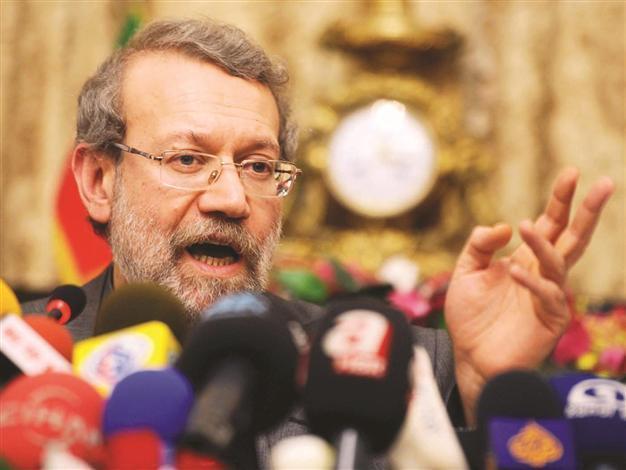Iran hoping sanction end at Iraq meet
TEHRAN

The West must take positive steps, says Iran’s Parliament Speaker Larijani. DAILY NEWS photo, Selahattin SÖNMEZ
Talks focused on Tehran’s nuclear program scheduled for May 23 in Baghdad between Iran and world powers will likely not resolve all of the issues, an aide to Iran’s supreme leader said yesterday. But Gholam Ali Hadad Adel, a lawmaker who is a senior adviser to Ayatollah Ali Khamanei, insisted that the powers on the other side of the table should lift their “illogical sanctions” at the meeting, according to Mehr news agency.“Iran expects the P5+1 group to put an end to the illogical sanctions in Baghdad, because the inefficiency of sanctions is proven even for Western leaders,” he said, referring to the P5+1 group, comprising the five permanent United Nations Security Council members plus Germany.
“They can show their goodwill through a trust-building effort” by lifting the sanctions, Hadad Adel said. “Although one should not expect all issues to be resolved in Baghdad, we can assume the [atmosphere] of the talks will follow in the footsteps of Istanbul,” he said. The Baghdad talks will continue discussions revived April 13 and 14 in Istanbul after a 15-month impasse.
While the Istanbul meeting managed to set a positive tone for talks to continue, the Baghdad round is seen as the first substantive meeting in which contentious issues will be broached. Ali Larijani, speaker of Iran’s Parliament, said yesterday that “one should not quickly judge” the Istanbul talks, according to ISNA news agency.
“So far, the format of the talks has been positive. But we have to see content-wise how many correct steps will be taken,” Larijani said. “The current problem is not the appearance of the talks. The problem is that the West imposes sanctions behind the scenes while in public it smiles at us. And these two contradictory behaviors are not compatible. The West should take positive practical steps,” he said, Agence France-Presse reported.
The United States, which is leading the Western economic sanctions imposed on Iran, is reportedly floating a concession to allow Iran minimal enrichment of uranium -- previously a no-go option -- if the Islamic republic in return permits more invasive inspections of its nuclear activities. Iran has sent signals suggesting it could negotiate over its medium-enriched uranium process, but officials have repeatedly said the Western sanctions should be eased. Tehran rejects Western accusations that it is seeking nuclear weapons capability. Iranian officials are to hold a separate meeting before the Baghdad summit May 13 to 14 with representatives from the International Atomic Energy Agency to address suspicions the U.N. nuclear watchdog also harbors.
System can redirect ‘enemy missiles’
Meanwhile, Iran has finally achieved the technological know-how to redirect enemy missiles, the commander of Khatam-ol-Anbiya Air Base has announced.
“Any missile, before doing any damage to the holy body of the Islamic Republic of Iran, will be either destroyed or redirected and will hit a target which we determine,” Brig. Gen. Farzad Ismaili told Fars news agency in an interview published yesterday. He added, “This is the capability of our electronic warfare system: We will re-program enemy missiles.” Ismaili also said the air defense equipment at Khatam-ol-Anbiya Air Base is “capable of shielding [the country] from hundreds of missiles.”
Col. Moharram Gholizadeh announced last September that Iran is designing an anti-missile system that would be capable of changing the direction of an incoming enemy missile. Gholizadeh also said the system would be capable of re-directing an enemy missile and making it hit a different target.
















